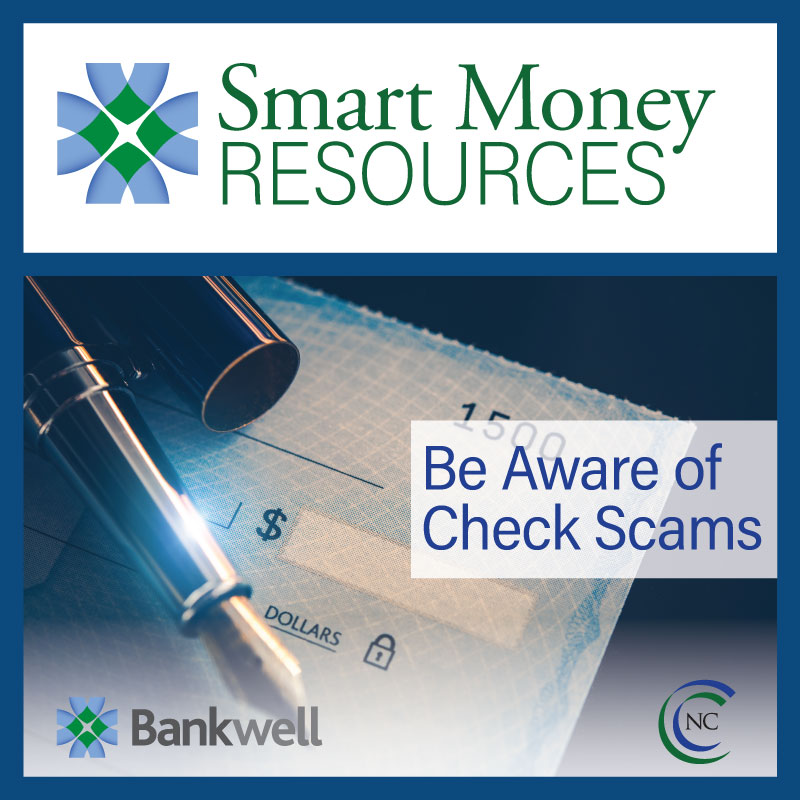Be Aware of Check Scams
The temperatures are dropping, the leaves are falling, and the holiday season is just ahead. During this very busy time, it’s more important than ever to be vigilant about potential fraud.
Fake checks continue to be one of the most common methods used to defraud consumers. Fraudulent checks can look exactly like personal, cashier’s checks, money orders or electronic checks, but they aren’t authentic.
Before you deposit any ‘unexpected’ check or wire funds with an unverified recipient, be extra cautious about scams.
How Check Scams Work
Scammers find different ways to reach their targets. A check scam typically starts with someone offering to:
- Buy something you advertised for sale
- Pay you to work at home
- Give you an “advance” on a sweepstakes or inform you that you’ve won
It’s also common for cybercriminals to issue you a check or money order worth more than the amount you’re allegedly due. You’re then instructed to wire the excess funds back to them. Once your money is sent, you learn that the entire transaction is fraudulent.
Tips to Prevent Fake Check Scams
- Even if a check has “cleared,” you may not be in the clear. By law, banks must make deposited funds available quickly, usually within two days. Although the funds may be available in your account, there’s no guarantee that the check was good, even if it was a cashier’s check or money order. Fake checks can take weeks to be discovered. By that time, the scammer is long gone with the money you sent. It’s critical to know and trust the person you’re dealing with for large checks. If you have any questions, talk to your banker. Be sure to explain the source of the check, the reasons it was sent to you, and whether you are being asked to wire money back.
- Don’t be fooled by the appearance of the check. Scam artists use sophisticated technology to create the appearance of legitimate checks. Some are counterfeit money orders or cashier’s checks, and others look like they are from actual business accounts. The companies whose names appear may be real, but the check has been dummied up without their knowledge. If you have questions, take it to your bank.
- Never ‘pay to play.’ There is no legitimate reason for someone giving you money to ask you to wire money back. That is a major red flag.
- Don’t respond to online solicitations for “easy money.” Social media scams may offer “quick ways to earn extra cash,” but easy money is rarely legal money. If it sounds too good to be true, it likely is.
- Verify the requestor before you wire or issue a check. It is important to know who you’re sending money to before you send it. Just because someone contacted you doesn’t mean they are a trusted source.
- Report any suspected fraud to your bank immediately. If you think you’ve been targeted as part of scam, contact your bank and report it to the Federal Trade Commission or The Better Business Bureau’s Scam Tracker.
Be Aware of Check Scams
The temperatures are dropping, the leaves are falling, and the holiday season is just ahead. During this very busy time, it’s more important than ever to be vigilant about potential fraud.
Fake checks continue to be one of the most common methods used to defraud consumers. Fraudulent checks can look exactly like personal, cashier’s checks, money orders or electronic checks, but they aren’t authentic.
Before you deposit any ‘unexpected’ check or wire funds with an unverified recipient, be extra cautious about scams.
How Check Scams Work
Scammers find different ways to reach their targets. A check scam typically starts with someone offering to:
- Buy something you advertised for sale
- Pay you to work at home
- Give you an “advance” on a sweepstakes or inform you that you’ve won
It’s also common for cybercriminals to issue you a check or money order worth more than the amount you’re allegedly due. You’re then instructed to wire the excess funds back to them. Once your money is sent, you learn that the entire transaction is fraudulent.
Tips to Prevent Fake Check Scams
- Even if a check has “cleared,” you may not be in the clear. By law, banks must make deposited funds available quickly, usually within two days. Although the funds may be available in your account, there’s no guarantee that the check was good, even if it was a cashier’s check or money order. Fake checks can take weeks to be discovered. By that time, the scammer is long gone with the money you sent. It’s critical to know and trust the person you’re dealing with for large checks. If you have any questions, talk to your banker. Be sure to explain the source of the check, the reasons it was sent to you, and whether you are being asked to wire money back.
- Don’t be fooled by the appearance of the check. Scam artists use sophisticated technology to create the appearance of legitimate checks. Some are counterfeit money orders or cashier’s checks, and others look like they are from actual business accounts. The companies whose names appear may be real, but the check has been dummied up without their knowledge. If you have questions, take it to your bank.
- Never ‘pay to play.’ There is no legitimate reason for someone giving you money to ask you to wire money back. That is a major red flag.
- Don’t respond to online solicitations for “easy money.” Social media scams may offer “quick ways to earn extra cash,” but easy money is rarely legal money. If it sounds too good to be true, it likely is.
- Verify the requestor before you wire or issue a check. It is important to know who you’re sending money to before you send it. Just because someone contacted you doesn’t mean they are a trusted source.
- Report any suspected fraud to your bank immediately. If you think you’ve been targeted as part of scam, contact your bank and report it to the Federal Trade Commission or The Better Business Bureau’s Scam Tracker.
The temperatures are dropping, the leaves are falling, and the holiday season is just ahead. During this very busy time, it’s more important than ever to be vigilant about potential fraud.
Fake checks continue to be one of the most common methods used to defraud consumers. Fraudulent checks can look exactly like personal, cashier’s checks, money orders or electronic checks, but they aren’t authentic.
Before you deposit any ‘unexpected’ check or wire funds with an unverified recipient, be extra cautious about scams.
How Check Scams Work
Scammers find different ways to reach their targets. A check scam typically starts with someone offering to:
- Buy something you advertised for sale
- Pay you to work at home
- Give you an “advance” on a sweepstakes or inform you that you’ve won
It’s also common for cybercriminals to issue you a check or money order worth more than the amount you’re allegedly due. You’re then instructed to wire the excess funds back to them. Once your money is sent, you learn that the entire transaction is fraudulent.
Tips to Prevent Fake Check Scams
- Even if a check has “cleared,” you may not be in the clear. By law, banks must make deposited funds available quickly, usually within two days. Although the funds may be available in your account, there’s no guarantee that the check was good, even if it was a cashier’s check or money order. Fake checks can take weeks to be discovered. By that time, the scammer is long gone with the money you sent. It’s critical to know and trust the person you’re dealing with for large checks. If you have any questions, talk to your banker. Be sure to explain the source of the check, the reasons it was sent to you, and whether you are being asked to wire money back.
- Don’t be fooled by the appearance of the check. Scam artists use sophisticated technology to create the appearance of legitimate checks. Some are counterfeit money orders or cashier’s checks, and others look like they are from actual business accounts. The companies whose names appear may be real, but the check has been dummied up without their knowledge. If you have questions, take it to your bank.
- Never ‘pay to play.’ There is no legitimate reason for someone giving you money to ask you to wire money back. That is a major red flag.
- Don’t respond to online solicitations for “easy money.” Social media scams may offer “quick ways to earn extra cash,” but easy money is rarely legal money. If it sounds too good to be true, it likely is.
- Verify the requestor before you wire or issue a check. It is important to know who you’re sending money to before you send it. Just because someone contacted you doesn’t mean they are a trusted source.
- Report any suspected fraud to your bank immediately. If you think you’ve been targeted as part of scam, contact your bank and report it to the Federal Trade Commission or The Better Business Bureau’s Scam Tracker.




